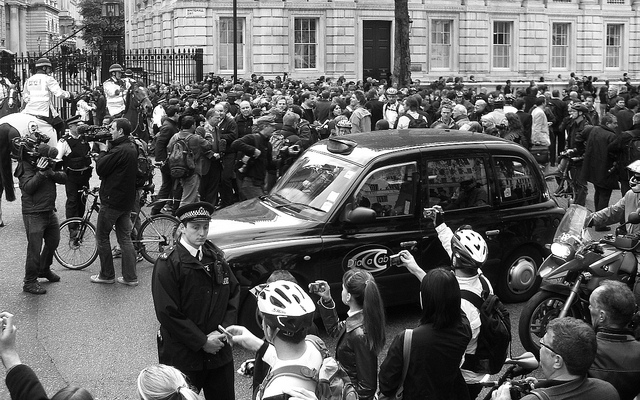The potential lessons of a contemporary history of Whitehall stretch far and wide
Britain’s Civil Service has been the subject of near constant study, with its permanent nature acting as a repository of information about the day-to-day functioning of our Westminster government. A new study by the Institute for Government and Kings College London, aims to combine an academic approach to research with modern think-tank communication techniques to create greater impact and to showcase the benefits of academic social science research, says Catherine Haddon.
Reform of the Civil Service, particularly the core ‘Whitehall’ part of it, has been a recurring theme in recent years. Whether through the Government’s own Civil Service reforms, scrutiny by the Public Administration Select Committee or the work of the Institute for Government, there is a lot to be understood, analysed and debated about this curious and sometimes enigmatic part of British government.
Part of the debate should be a good understanding of what has gone before: knowing how Whitehall has evolved, examining it comparatively over time, understanding different departments, thinking about the people and the roles they are asked to do and they skills they had, or did not. These are all valuable topics to understand in themselves, but they are also crucial to thinking about why and how to make it better.
The history of Civil Service reform is itself a fascinating lesson. Previous research by the Institute for Government has looked at how relatively small bodies at the centre of government have sometimes been used as a tool to drive change across departments. Looking at how different units have been set up, the kinds of people that staffed them, their relationship with departments and the degree of political credibility and support they get (particularly from the Prime Minister) has revealed useful tips for contemporary Whitehall in continuing to adopt this method for reform.
But the potential lessons from history go much wider. Thinking about how and for what disparate purposes Whitehall has tried to measure performance in public services, considering recruitment and promotion within the central Civil Service and asking how that relates to the skills and capability of staff – there are many historical questions for which more detailed research can be practically useful. And then there is the value of historical context more generally. Understanding the broader shifts in our governmental system involve complex questions of causality and context. History, its sources and methodology, adds an important dimension to the many different disciplines that study government. And it is a useful communication tool. The Institute for Government has often found historical case studies to be a valuable way of helping audiences understand complex problems in government, whether it is policy success or commissioning in public service markets.
This is why the Institute for Government and King’s College London have embarked on a new project to explore the history of Whitehall between 1979 and 2010. The project will run over three years, funded by the Arts and Humanities Research Council. It will combine academic research with a strong emphasis on using different kinds of media, events and publications to transmit findings to both academic and practitioner audiences throughout the programme. The aim is to make sure this important part of British government is understood historically and that lessons from the past are available to making government more effective.
There are many reasons why this project is especially valuable now. It is a good time to look back. The 2010 election marked the end of two very long periods of single-party government, first by the Conservatives and then by Labour. The period saw extraordinary changes in technology, in the role of Europe, relationships between the centre of government and the public sector and changes in the international world (not least the seismic changes for Whitehall that came with the end of the Cold War or since 9/11). But there are also major continuities – issues of performance, accountability, organisation and leadership saw similar debates 30 years ago as they do now.
The archives of the first Thatcher government are now open to the public and the National Archives will be releasing a further two years of documents annually thanks to the 20 year rule. Most No.10 files and many Cabinet Office files are now digitised (valuable for highlighting to new audiences, but thankfully enough departmental files remain paper only to ensure long and pleasant hours in the National Archives).
But the period is also one in which the nature of those archives is going to change drastically. The move from paper to electronic records, emails and word documents rather than memos and letters, means very different sources for historians. For the latter part of the period there will be more evidence published on the web and more opportunities for gathering different kinds of evidence, including data. A final factor is eyewitnesses. Those of the earlier period are fewer and making sure their recollections are collected is itself an important job. Piecing together the oral history of the period is something that should not wait. If anything, it will be a valuable test for future archival records.
A final reason is Whitehall’s institutional memory. The retirement of another generation of permanent secretaries since 2010, significant manpower reductions, more frequent turnover of staff, newer generations entering Whitehall and newer politicians are all reasons why Whitehall’s demand for its own history will grow. Finding ways to transmit that learning and the insights it may bring for how institutional memory is developed in Whitehall are important lessons.
This is an ambitious project. High demand for its products, great raw material through its sources and some really important and fascinating research questions will provide challenges along the way, but should also be a mark of its success. Combining academic research and think-tank communication approaches will highlight some of the issues academics face of achieving and measuring scholarly impact. It will also provide a standpoint from which to show the benefits of academic study, driven by strong research questions and exhaustive examination of the sources in addressing contemporary concerns.
—
Note: You can find out more about the IFG project mentioned in this piece by clicking here. This piece represents the views of the author and not those of Democratic Audit. Please read our comments policy before posting. The shortened URL for this post is: https://buff.ly/1hd5mSF
—

Catherine Haddon is a fellow at the Institute for Government. She joined the Institute in November 2008 from academia. She leads the Institute’s work on the history of Whitehall and reform and on managing changes of government.






 Democratic Audit's core funding is provided by the Joseph Rowntree Charitable Trust. Additional funding is provided by the London School of Economics.
Democratic Audit's core funding is provided by the Joseph Rowntree Charitable Trust. Additional funding is provided by the London School of Economics.
Interesting and much-needed project. One dimension – often overlooked: the homogenisation of Civil Service personnel management and pay structures over the last 20 years (despite so-called delegation), combined with contracting-out of key functions like IT, has destroyed capability in a variety of specialist areas: IT, procurement, transport planning, contract management, scientific and technical advice and assurances… the list goes on. Feel free to contact me to discuss.